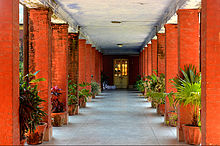Perkins School for the Blind, in Watertown, Massachusetts, was founded in 1829 and is the oldest school for the blind in the United States. It has also been known as the Perkins Institution for the Blind.

The subject of blindness and education has included evolving approaches and public perceptions of how best to address the special needs of blind students. The practice of institutionalizing the blind in asylums has a history extending back over a thousand years, but it was not until the 18th century that authorities created schools for them where blind children, particularly those more privileged, were usually educated in such specialized settings. These institutions provided simple vocational and adaptive training, as well as grounding in academic subjects offered through alternative formats. Literature, for example, was being made available to blind students by way of embossed Roman letters.
Service and supports for people with disabilities are those government or other institutional services and supports specifically provided to enable people who have disabilities to participate in society and community life. Some such services and supports are mandated or required by law, some are assisted by technologies that have made it easier to provide the service or support while others are commercially available not only to persons with disabilities, but to everyone who might make use of them.

The CNIB Foundation is a Canadian charitable organization and volunteer agency dedicated to assisting Canadians who are blind or living with vision loss, and to provide information about vision health for all Canadians. Founded in 1918 as the Canadian National Institute for the Blind to assist soldiers who had been blinded in the First World War, CNIB originally offered sheltered care and specialized employment to people with vision loss. It has since expanded to include other programs and services, including research, public education, rehabilitation counselling and training, advocacy and an alternative-format library for people living with a print disability. It is a member of the Braille Authority of North America.
The National Library Service for the Blind and Print Disabled (NLS) is a free library program of braille and audio materials such as books and magazines circulated to eligible borrowers in the United States and American citizens living abroad by postage-free mail and online download. The program is sponsored by the Library of Congress. People may be eligible if they are blind, have a visual disability that prevents them from reading normal print, or a physical disability that keeps them from holding a book. Library materials are distributed to regional and subregional libraries and then circulated to eligible patrons. In total there are 55 regional libraries, 32 subregional libraries, and 14 advisory and outreach centers serving the United States and its territories: the District of Columbia, Puerto Rico, the U.S. Virgin Islands, and Guam.
The Ministry of Social Justice and Empowerment is a Government of India ministry. It is responsible for welfare, social justice and empowerment of disadvantaged and marginalised sections of society, including scheduled castes (SC), Other Backward Classes (OBC), LGBT people, the disabled, the elderly, and the victims of drug abuse. It also helps in the enforcement of legislation with regards to these marginalized groups to better enforce anti-discrimination policies.
A sighted child who is reading at a basic level should be able to understand common words and answer simple questions about the information presented. They should also have enough fluency to get through the material in a timely manner. Over the course of a child's education, these foundations are built on to teach higher levels of math, science, and comprehension skills. Children who are blind not only have the education disadvantage of not being able to see: they also miss out on the very fundamental parts of early and advanced education if not provided with the necessary tools.
Pandit Deendayal Upadhyaya National Institute for Persons with Physical Disabilities (Divyangjan) (P.D.U.N.I.P.P.D.) is an autonomous organisation under the administrative and financial control of Ministry of Social Justice and Empowerment, government of India.
Henshaws Society for Blind People, by Oldham businessman Thomas Henshaw, is a specialist charity providing support, advice and training to anyone affected by sight loss and other disabilities.

Jagadguru Rambhadracharya Divyanga University (JRDU), formerly Jagadguru Rambhadracharya Handicapped University, is a private university in Chitrakoot, Uttar Pradesh, Bharat. It was established in 2001 by Jagadguru Rambhadracharya for disabled people. It was the only university in the world exclusively for disabled people until the establishment of Dr. Shakuntala Misra National Rehabilitation University at Lucknow.
Mitra Jyothi established in 1990, is a charitable trust registered under Indian Trust Act based in Bangalore. Its aims to support the visually impaired through various programs it offers. These programs include Talking Book Library, Computer Training Center, Independent Living Skills, Braille Transcription Center and Job Placement. It received State Award in 2010 from the Directorate of Disabled Welfare and Senior Citizens, Government of Karnataka for its exemplary service for persons with disabilities. Mitra Jyothi is also a member of the DAISY Forum of India (DFI). DFI is a forum of Not for profit organizations from India who are involved in production of books and reading materials in accessible formats for persons who cannot read normal print.

The Braille Authority of North America (BANA) is the standardizing body of English Braille orthography in the United States and Canada. It consists of a number of member organizations, such as the Braille Institute of America, the National Braille Association, and the Canadian National Institute for the Blind.
Chakshumathi is a nongovernmental, not for profit organization based in Thiruvananthapuram, Kerala, India, working for developing resources for the use of visually impaired people. It is an "Empowerment and Assistive Technology Centre for Blind". The organization, which was inaugurated in June 2011, is a member of DAISY Forum of India. The organization is currently headed by V.K. Damodaran, a former President of Kerala Sasthra Sahithya Parishad.
Jawahar Lal Kaul is an Indian social worker and the founder of the All India Conference of the Blind, an NGO working towards the rehabilitation of the blind. He was honoured by the Government of India, in 2014, which bestowed on him the Padma Shri, the fourth highest civilian award, for his services to the field of arts.
The National Council for the Blind, Malaysia (NCBM) set up the Braille Press on 1 April 1998 under the Chairmanship of the late Datin Roquaiya Hanim Tun Hussein. It was officially declared open by Yang Berhormat Dato’ Sri Mohd. Najib Tun Abdul Razak, the then Minister of Education, Malaysia, on 24 November 1998.

Tiffany Brar is an Indian community service worker who became blind as an infant due to oxygen toxicity. Brar is the founder of the Jyothirgamaya Foundation, a non-profit organization that teaches life skills to blind people of all ages. She is a trainer, a campaigner for disability awareness and an advocates for an inclusive society.
Father Thomas J. Carroll was a Catholic priest and a pioneer in treatment for people who became blind later in their lives,. He was also a leader in implementing liturgical renewal in the Catholic church after Vatican II and took an active part in the civil rights movement.
Bengt Olof Lennart Lindqvist was a Swedish politician and advocate of persons with disabilities.

Jyothirgamaya Foundation is a nonprofit organization, based in Thiruvananthapuram Kerala which is actively involved in the empowerment of persons with visual impairment founded in 2015 by Tiffany Brar. The project started as a mobile blind school in 2012. Tiffany Brar herself, traveled through rural areas in public transport in search of blind people of all ages in rural areas in India, with the aim of bringing out of the four walls of their house, to which they are confined, and brings a new light to their eyes, which has nothing to do with their eyesight. Jyothirgamaya Foundation holds Special consultative status with United Nations.







